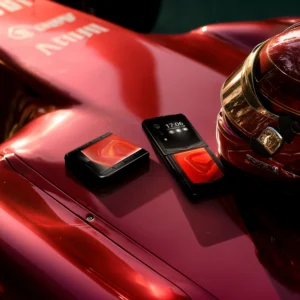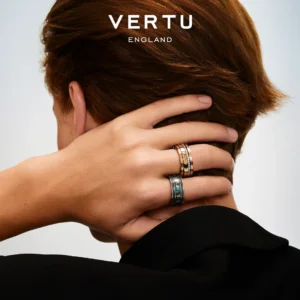
The way words change over time is fascinating. It shows how language grows and adapts. Words like “vertu” give us a peek into the past, revealing how culture and society shaped English history. Studies show people started using more specific words after 1850, and these words became more common over time. You might ask, what does Vertu mean in Old English? Learning about this helps you understand English's long and interesting history.
Key Takeaways
-
The word ‘vertu' comes from Old English and was shaped by Latin and Germanic languages. It stood for bravery and being good.
-
After the Norman Conquest, Old French changed how people saw ‘vertu.' Its meaning grew to include strength and excellence in morals.
-
During the Renaissance, ‘vertu' came to mean creativity and smart thinking. It showed how people valued art and ideas.
-
Today, ‘vertu' is linked to fancy brands. It stands for style and top quality, like in luxury phones.
-
Learning about ‘vertu' shows how language changes with culture. It connects words to what people care about in society.
The Old English Roots of ‘Vertu'
What does ‘Vertu' mean in Old English?
Have you ever wondered what “vertu” meant in Old English? The word “vertu” as we know it today didn’t exist back then. Its origins come from Old English, influenced by Latin and Germanic languages. The term evolved from the Latin word virtus, which means “bravery,” “strength,” or “excellence.” These ideas were important to the Anglo-Saxons, who valued strong character and moral goodness.
In Old English, words about virtue described traits like courage and honor. These qualities were vital in a society that admired loyalty and bravery. While “vertu” wasn’t a word they used, its ideas were already part of their culture. Learning this shows how English history reflects the values of its people.
The influence of Latin and Old French on its early meaning
The history of “vertu” shows how languages borrow from each other. After 1066, when the Normans took over England, Old French became a big influence. The Old French word vertu, from Latin, meant moral strength and excellence. It entered Middle English and shaped how people talked about character.
Latin also played a key role as the language of the church and learning. Many Old English words were replaced or added to with Latin-based ones. This mix of languages gave people more ways to talk about ethics and values. This moment in history shows how cultural exchange shaped the English language.
Cultural significance of ‘Vertu' in Old English society
For Anglo-Saxons, virtue wasn’t just a word—it was a way to live. Traits like bravery, loyalty, and wisdom were celebrated in stories like Beowulf. These tales showed how important good character and personal strength were. Even though they didn’t use the word “vertu,” its ideas were central to their lives.
Virtue was like a guide for how people should act. Leaders needed these traits to gain respect and loyalty. The Anglo-Saxon focus on strength and morals influenced how later generations understood “vertu.” Knowing this helps you see the deep history behind the word and its meaning today.
Middle English and the Norman Conquest
The impact of Norman French on the word's evolution
The Norman Conquest in 1066 changed English forever. The Normans brought their language, Norman French, to England. It became the language of rulers, laws, and government. English started borrowing many French words. Early examples include “baron,” “feast,” and “noble.” These words showed how the French elite influenced English speakers. Later, as English grew stronger, even more French words joined the language. Words like “crown,” “royal,” and “parliament” came from this time. These new words expanded English and changed how people talked about virtue and morality.
Did you know? The word “vertu” comes from Old French vertu. It meant moral strength and excellence. This shows how culture can shape language over time.
Changes in spelling, pronunciation, and usage
French words changed how English sounded and looked during this time. Experts like Baugh and Cable studied these changes. Vowel sounds shifted to match French pronunciation. Spelling became less consistent because scribes copied French styles. Words like “vertu” adapted to fit these new rules. People also started using French words to sound more refined or official. Borrowed terms helped describe ideas like virtue in new ways.
The role of medieval literature in shaping ‘Vertu'
Medieval stories helped spread and define the meaning of “vertu.” Writers like Geoffrey Chaucer used “vertu” in works like The Canterbury Tales. They described it as moral excellence and noble traits. Stories showed “vertu” as courage, honor, and generosity. Literature reflected what society valued and helped standardize words. Through tales and poems, writers taught people about virtue as a life guide. This kept “vertu” important in discussions about character during Middle English times.
Renaissance and Early Modern English
The Renaissance's influence on the connotations of ‘Vertu'
The Renaissance changed how people thought about life and ideas. This shift also affected the meaning of “vertu.” During this time, people celebrated human talents and achievements. “Vertu” started to mean more than just moral strength. It also came to represent creativity, intelligence, and artistic skill. This change showed the growing focus on art and human potential.
Scholars during the Renaissance studied old texts from Greece and Rome. They admired the virtues described in these works. These ideas influenced how people thought about “vertu” and personal character. The Renaissance gave “vertu” a deeper and richer meaning.
How ‘Vertu' was used in art, philosophy, and literature
Art, philosophy, and writing often focused on “vertu” during the Renaissance. Famous artists and writers showed examples of virtue in their work. Paintings often featured strong and wise figures. Philosophers like Machiavelli wrote about “virtù” as a leader's quality. They said it included courage, intelligence, and flexibility.
Writers used “vertu” to talk about morality and human potential. Shakespeare’s plays showed characters trying to be virtuous or facing moral struggles. These stories explored how “vertu” could lead to greatness or failure. Through art and writing, the Renaissance made “vertu” an important topic.
The standardization of English and its effect on the word
The Renaissance also began the process of making English more uniform. Before this, English had many different spellings and accents. Where you lived often decided how you spoke or wrote. The printing press helped spread books and encouraged consistent spelling.
As English became more standardized, words like “vertu” got fixed spellings. Dictionaries and grammar books explained how to use words correctly. This made English easier to learn and preserved meanings of words like “vertu.” It ensured their place in the history of the language.
Late Modern English and Globalization

The decline of ‘Vertu' in everyday language
In Late Modern English, “vertu” stopped being commonly used. Society changed, and simpler words replaced older ones. People wanted language that was clear and easy to use. Industrialization made practicality and efficiency more important. Words like “virtue” became popular, while “vertu” felt old-fashioned. This shows how English changes with its speakers' needs. The fading of “vertu” reflects how language evolves over time.
How industrialization and globalization reshaped its meaning
Industrialization and globalization changed language and culture quickly. New inventions needed new words to describe them. The meaning of “vertu” shifted as progress became more valued than tradition. Global trade mixed English with other languages, creating new meanings. During this time, “vertu” came to mean skill or craftsmanship too. This shows how cultural exchange reshaped words like “vertu.”
The emergence of niche applications, including branding
Today, “vertu” has found new uses in specific areas. For example, it is used in luxury branding. The name “VERTU” suggests elegance, quality, and exclusivity. Companies use such words to attract customers who like sophistication. The VERTU brand, known for luxury phones, follows this idea. It blends old traditions with modern style. This shows how old words can take on fresh meanings in modern culture.
Modern Usage and the Legacy of ‘Vertu'
Current meanings and connotations of ‘Vertu'
Today, “vertu” means elegance and high quality. It is not used in daily speech much anymore. However, it still represents moral goodness, skill, and fine craftsmanship. You might hear it when talking about art, antiques, or fancy items. In these cases, “vertu” often describes things made with great care and talent.
The way “vertu” is used now shows its long history. It once described personal virtues in Old English. Now, it stands for style and grace in modern times. This change shows how words adjust to fit new cultures. By learning about this shift, you understand more about English and how it keeps cultural ideas alive.
The word's presence in modern branding, including luxury products
In luxury brands, “vertu” has found a special place. The word suggests high quality, uniqueness, and creativity. A good example is the VERTU brand, famous for luxury phones. These phones mix old-fashioned craftsmanship with modern technology. One product, the SIGNATURE S+ BLACK STEEL ALLIGATOR SKIN – BASALT BLACK, shows this mix perfectly.
Luxury companies use words like “vertu” to feel fancy and important. For VERTU, the name fits its goal of offering unique, high-end devices. By keeping its strong reputation and adding new ideas, the brand stays current. This shows how “vertu” still matters in today’s global market.
Reflections on the cultural and linguistic legacy of ‘Vertu'
The story of “vertu” gives us a look at English history. It shows how words can change and take on new meanings. From Old English to luxury branding, “vertu” reflects how culture and language grow together.
The word has kept its ideas of excellence and beauty while changing with the times. This shows how flexible language can be. Learning about “vertu” helps you see how English connects to past values and traditions. It reminds us that language is more than words—it’s a record of human history.
The story of “Vertu” shows how words change with time. It started with Old English virtues and now links to brands. This journey proves that language adjusts to match cultural values. Learning about word origins helps you see these changes clearly. It also shows how words keep old traditions while adding new ideas. By studying “Vertu,” you learn how language and culture grow together.
FAQ
What does the word “vertu” mean today?
Today, “vertu” means elegance, skill, and uniqueness. It often refers to fancy items or art made with great care. Though not used in daily talk, it still appears in branding and special uses.
How did the Norman Conquest change the word “vertu”?
The Norman Conquest brought Old French words like “vertu” into English. This added new words and improved how people talked about moral strength. The mix of languages helped shape many English words.
Why is learning about “vertu's” history important?
Learning about “vertu's” history shows how language changes with culture. It explains how values like bravery and excellence shaped society. By studying its past, you learn more about how English grew over time.
How is “vertu” linked to luxury brands?
Luxury brands use “vertu” to show style and quality. For example, the VERTU brand mixes old craftsmanship with modern tech. This shows how “vertu's” ideas of excellence and uniqueness still matter today.
How did stories shape the meaning of “vertu”?
Stories helped explain what “vertu” meant. Writers like Chaucer used it to show noble traits and goodness. Tales and poems spread its meaning and reflected what people valued in different times.
 Pay Over Time With PayPal & Klarna
Pay Over Time With PayPal & Klarna







